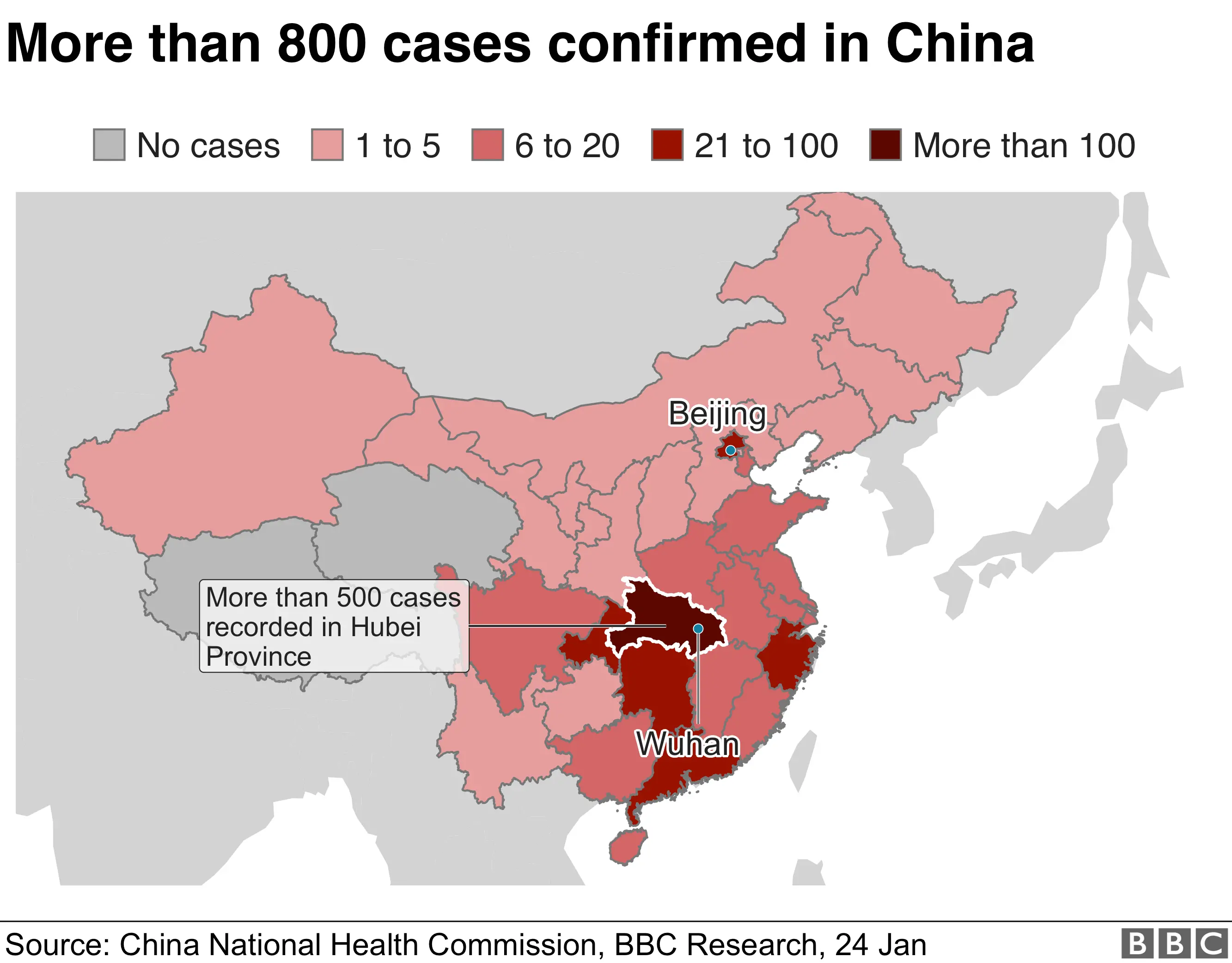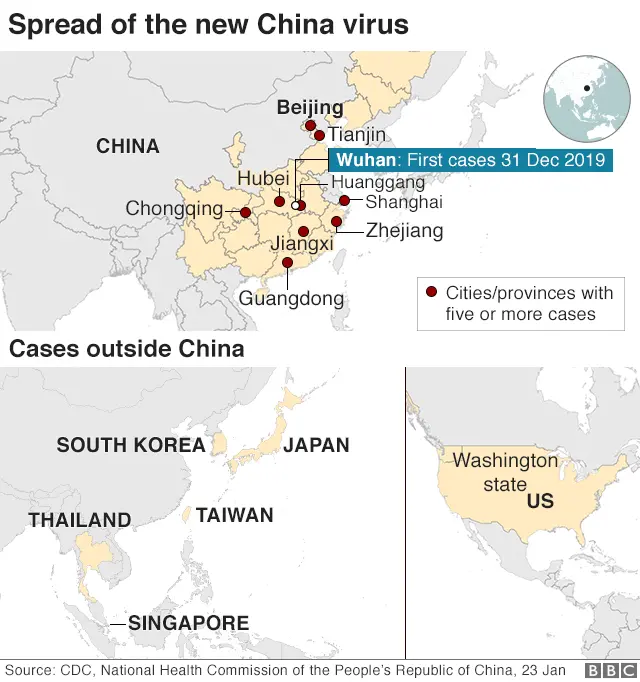China coronavirus: Death toll rises as more cities restrict travel
China has widened its travel restrictions in Hubei province - the centre of the coronavirus outbreak - as the death toll climbed to 26.
The restrictions will affect at least 20 million people across 10 cities, including the capital, Wuhan, where the virus emerged.
On Thursday, a coronavirus patient died in northern Hebei province - making it the first death outside Hubei.
Another death was later confirmed in north-east Heilongjiang province.
The province borders Russia and is more than 2,000 kilometres (1,200 miles) from Wuhan.
Nationally, there are currently 830 confirmed cases of patients infected with the virus.
A small number of confirmed cases have also been found outside China, including in Thailand, the US, Taiwan, South Korea, Japan, Vietnam and Singapore.
The growing list of restrictions comes on the eve of Lunar New Year - one of the most important dates in the Chinese calendar, when millions of people travel home.
 Getty Images
Getty ImagesTravel restrictions vary from city to city.
Wuhan is effectively on lockdown: all bus, subway and ferry services have been suspended and all outbound planes and trains cancelled.
Residents have been advised not to leave, and roadblocks have been reported.

Ezhou, a smaller city in Hubei, shut its railway station. The city of Enshi has suspended all bus services.
City officials in the capital, Beijing, and Shanghai have also asked residents who return from affected areas to stay at home for 14 days to prevent the spread of the virus, local media report.
- Have you been affected? Get in touch: [email protected]

Analysis - Can the coronavirus be stopped?

We now know this is not a virus that will burn out on its own and disappear.
Only the decisions being made in China - including shutting down cities - can stop it spreading.
Scientists have revealed each infected person is passing the virus onto between 1.4 and 2.5 people.
It is known as the virus's basic reproduction number - anything higher than 1.0 means it's self-sustaining.
Those figures are early estimates, but put coronavirus in roughly the same league as Sars. There are two crucial outstanding questions - who is infectious and when are they infectious.
The fact only 25% of reported cases are severe is a mixed blessing.
Yes, that is less dangerous than Sars, but if those hard-to-detect mild or maybe symptomless cases are contagious too, then it is much harder to contain.
And we still don't know when people are contagious. Is it before symptoms appear, or only after severe symptoms emerge? One is significantly harder to stop spreading than the other.

The impact of the coronavirus is not limited to Hubei province. Authorities have also shut major tourist sites including the Forbidden City in Beijing and a section of the Great Wall and cancelled major public events in other parts of the country, including:
- Traditional temple fairs in Beijing
- An international carnival in Hong Kong
- Hong Kong's annual football tournament
- All public Lunar New Year celebrations in Macau
Shanghai's Disney Resort is temporarily closing, as are McDonald's in five cities.
Earlier, information from China's National Health Commission, when the death toll was 17, said the youngest person who died from the virus was 48 and the oldest was 89.
Most victims were elderly and suffered from other chronic diseases including Parkinson's and diabetes.
Wuhan - home to around 11 million people - is now rapidly building a new 1,000-bed hospital to deal with the increasing number of victims.
 AFP
AFPThe project will "solve the shortage of existing medical resources" and would be "built fast [and] not cost much... because it will be prefabricated buildings".
Videos have been circulating on social media, reportedly taken by Wuhan residents, showing long queues at local hospitals.
In one video on Twitter taken from Chinese social media, a man can be heard complaining, saying patients could be queuing for as long as 10 hours. The video could not be independently verified by the BBC.
Allow X content?

The World Health Organization has not classed the virus as an "international emergency", partly because of the low number of overseas cases.
"It may yet become one," said the WHO's director-general, Dr Tedros Adhanom Ghebreyesus.

How are people coping in the lockdown?
One doctor, who requested anonymity, describes the conditions at a hospital in Wuhan.
"In the last two weeks, there has been an alarming rate of spread," she told the BBC. "The hospitals have been flooding with patients, there are thousands, I haven't seen so many before."
One woman, Jane, flew back to Wuhan from Beijing just before the lockdown.
"I feel very uneasy," she said. "But for me, because my child, my husband and family… are in the Wuhan area, I have to go back."
Daniel Pekarek, a software engineering student at Wuhan University, told the BBC he and his friends were all staying in their rooms.
"I was planning to stay in my apartment because I'm scared to go to the gym, and I'm scared to go to out in public, and not many people are willing to go out."

What's the global situation?
Vietnam and Singapore were on Thursday added to the nations recording confirmed cases, joining Thailand, the US, Taiwan and South Korea.
Japan and South Korea have both confirmed their second cases.
On Friday, Singapore confirmed its third case - who is known to be the son of another patient. Thailand has five.


Other nations are investigating suspected cases, including the UK, US, and Canada.
Many authorities have announced screening measures for passengers from China, including on Thursday the major airport hubs of Dubai and Abu Dhabi.
Taiwan has banned people arriving from Wuhan and the US state department warned American travellers to exercise increased caution in China.

Learn more about the new virus
 Getty
Getty- Your questions: You asked, we answered
- The story explained: How worried should we be?
- Wuhan profiled: The city now in lockdown
- In detail: Follow all our coverage here

Are you in China? Have you been affected by the lockdown in various cities? Email [email protected].
Please include a contact number if you are willing to speak to a BBC journalist. You can also contact us in the following ways:
- WhatsApp: +44 7756 165803
- Tweet: @BBC_HaveYourSay
- Send pictures/video to [email protected]
- Upload your pictures / video here
- Please read our terms & conditions and privacy policy
